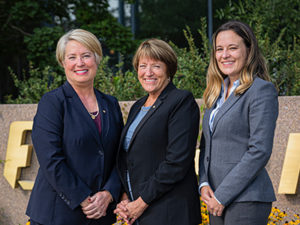
Numbers often tell a story. At First Interstate Bank, for instance, women compose 72 percent of the bank’s 2,483-person workforce; 62 percent of the bank’s managers are female; more than half of the 22-member senior leadership team is female, and four women serve on the board of the Billings, Mont.-based bank. Three women — CFO Marcy Mutch, Chief Operating Officer Jodi Delahunt Hubbell, and Chief Human Resources Officer Rachel Turitto — sit on the bank’s nine-person executive team; another three — Lorrie Asker, Jocelyn Lane and Tawnie Nelson — serve as regional presidents, collectively overseeing 1,378 people spread across the $18.4 billion bank’s six-state footprint.
The numbers tell a story of gender equity and opportunity. Mutch, Delahunt Hubbell, Turitto, Asker, Lane and Nelson — composing exactly half of BankBeat’s 2021 class of “Outstanding Women in Banking” — add in their career histories and tales of professional growth. They share the circumstances that led them to leadership positions at the bank, what makes it unique, and how each contributes to the bank’s twin goals of becoming an employer of choice and a market leader wherever it opens a branch.
Career trajectory woven like a web
At 15 years, Mutch claims the longest tenure of the six. She came to the bank after almost two decades at a public accounting firm. It was the mid-aughts, years thick with the demands of a growing family. Mutch recounted how she managed it all by cutting her hours in half — for about a decade. It’s not a move devoid of risk: Women who carve-up the nine-to-five to dish out more hours to their children are often pushed over to the “mommy-track.” Some careers don’t recover.
But that didn’t happen. “It was really a result of First Interstate’s attitude toward you,” Mutch said. “They didn’t have a bias about that.”
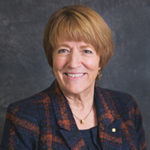
In 2010, FIB successfully executed an IPO, raising more than $150 million to fund stockholder redemptions and growth. Mutch was offered a role in investor relations, which gave her an opportunity to work with the executive management team and “understand what shareholders were looking for,” she explained. The job required her to make presentations to the board, useful practice later when she vied to become the bank’s first female CFO in late 2015 as her predecessor in the position (and her mentor), Kevin P. Riley was named CEO. In each of her roles at FIB, Mutch said there was a period of “figuring it out as we went.”
The leaders at First Interstate foster informal, on-the-job learning opportunities, because they’ve availed themselves of such opportunities. It’s important to learn something new, preached Delahunt Hubbell, who claims to have never taken a job for which she was fully qualified.
After college, Delahunt Hubbell jumped straight into banking through U.S. Bank’s management training program. There, she held nine positions in 10 years, including being named a vice president at age 28. Later she served as CEO of Commerce Bank of Oregon, part of Zions Bancorporation, and as deputy to the chief risk officer at the holding company, a role that came with a “steep, steep, steep learning curve.”
Delahunt Hubbell joined First Interstate four years ago as chief banking officer in Bend, Ore., a position she held for all of five months before being named COO and executive vice president. “Kevin [Riley] has always said that he was building a good team. As an executive team, we started talking about what was the optimal organizational structure and that’s when I became a COO.”
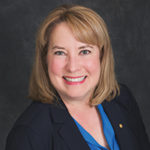
Delahunt Hubbell claims her greatest asset is her diversity of experience. “Her work trajectory and career experiences, from teller to executive, give [Jodi] a perspective unique to that of her peers,” Riley commented.
“I always saw my career as this sort of a spider web,” Delahunt Hubbell said. “I didn’t have a ladder. I didn’t say at some point in my career, ‘I want to be the chief operating officer here.’ I knew I wanted to continue to move up in the companies I was working at. So when opportunities presented themselves, I asked: ‘What would be something that would round me out?’”
For its broad (and expanding) workforce, FIB utilizes LinkedIn Learning so people can pick up skills, including ones focused on leadership, emotional intelligence and communications. The bank also nominates employees for leadership development, and encourages employees to put themselves forward for new roles and promotions.
“One of the things I really think we do well at First Interstate is we recognize talent,” Delahunt Hubbell said. “We post every job at every level. Sometimes we have conversations with people, asking ‘Have you considered applying for this?’ They may not see it in themselves, but we see it in them. And we give them an opportunity.”
Career development is intentional at the bank, said Turitto. FIB makes a concerted effort not only to promote from within, but to train and support new managers so they succeed. “We’re putting together a lot of curriculum that will be rolled out to our leaders,” Turitto said. “Those career coaching conversations can’t just be held for your favorite employee.” They need to be equitable, and scalable, because the bank is big, and getting bigger.
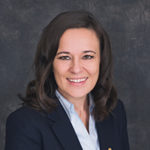
Thirty-seven year old Turitto, a first-generation college graduate who grew up in a single-parent household that availed itself of food stamps, spearheads the bank’s diversity, equity and inclusion initiatives. Succeeding at DEI is key to attracting and retaining employees, Turitto said.
She personally delivers a “diversity of experience” perspective when she sits in on product meetings when the bank seeks ways to serve unbanked and underbanked populations. “When they talk about some of the fees and the pieces they want to put together, I am one of the people who push back,” Turitto said. “I say, ‘You know, that dollar amount might seem insignificant to you, but I can tell you that would have been a hardship for my family.’”
Turitto came to the bank from an HR role in Montana’s state government. A native of the Billings area, she left her job in Helena when her mother offered her family free childcare.
The limited accessibility of affordable childcare is something banks, communities and governments grapple with (mostly unsuccessfully) as they seek to keep their pipelines filled with talented professionals. FIB has formalized a policy to allow for alternative work arrangements to help its employees creatively solve scheduling conflicts. It offers flexible spending accounts for dependent care, and a caregiver leave program. During the pandemic, the bank created a policy called Special Condition Time Off to provide employees time to care for themselves or family members impacted by Covid-19, or to focus on children when daycares closed. Time applied under the program was not charged against employee PTO. During 2020, the bank awarded 212,760 hours of time off through the program.
“I’m proud of our benefit package and I think we’re thoughtful about it,” Turitto said. “When I look at the childcare assistance programs that we have in place, to me, it’s very meaningful.”
The diversity piece can challenge a bank that serves customers in Seattle and Portland, Ore., but also ranching communities across the mountain west, Turitto said. “Individuals who sit in a metropolitan market have a very different experience than some people who sit in our rural Wyoming market where the only [diversity] they see is on TV,” she said.
As it unfolded its DEI initiatives, the bank focused initially on definitions. “But what’s been more powerful is to come along behind that with stories,” said Turitto, who like Delahunt Hubbell, includes her gender pronouns on her LinkedIn page. “Every month we’re focusing on different celebrations, different heritage models, and we’re actually talking to individuals” about life experiences. Stories are “helping with creating empathy and understanding.”
DEI: Past the prosaic

Where the rubber hits the road on DEI is outside of the corporate headquarters, out with the lenders who, on any given day, might be helping customers brand cattle or finance a fleet of trucks. Responsible for carrying the DEI message to individual markets are Asker, Nelson and Lane.
“What I encourage people to think about is how we all are diverse,” said Nelson, regional president for Oregon, western Washington and South Dakota — about as varied a region as one can be. “We didn’t all grow up in the same home, with the same family, with the same set of rules, with the same experiences. We openly talk about what makes each one of us diverse.”
Those conversations might include a person’s abilities or what circumstances they faced. “That’s really how I have embraced both the FIB values and DEI,” Nelson said. “It’s not trying to fill a quota.”
When experts talk about diversity of experience being critical to an organization’s success, they mean a mix of people who’ve experienced adversity or constant change, people who’ve found the courage to move, or to leave companies where they weren’t valued.
Diversity of experience comes through work history. Nelson, for instance, worked for two decades at Wells Fargo. She jumped to FIB around the time it had acquired Bank of the Cascades. The move required her to think differently about banking. “Kevin helped me with some grace. Having come from a big bank, with a big bank mentality, he really helped instill what it looked like to show up as a community banker,” said Nelson in her unapologetically direct manner.
Nelson leaves “little ambiguity in her positions,” said Russ Lee, chief banking officer. Lee credits Nelson with challenging “issues and topics with humanity and compassion.”
Expanding the pool of diverse candidates is one of those issues Nelson is passionate about. “We want to hire people like ourselves and that’s the wrong thing to do,” Nelson said. “The mistake you make is just taking the group [of candidates] that applies.”
Nelson encourages the managers in her region to always be building relationships — with peer banks, at social events, at community events, or through LinkedIn Learning — and to think outside of their comfort zones.
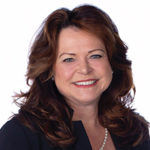
Lane personifies moving beyond a “comfort zone.” Based in Missoula and with oversight of FIB’s Montana region, Lane spent the first 25 years of her career working for banks in Florida. She’d made her way to Seattle when she was in her mid-40s, and was recruited by Lee, who came to FIB through the bank’s acquisition of Inland Northwest Bank.
As a newbie (at FIB not quite two years) Lane said she feels totally supported by Lee and all of FIB’s executive leadership. But it was a female bank CEO at one of her former banks who left the greatest impression on her. “It was very meaningful to me to see another female in a really incredible leadership role,” said Lane.
Lane was instructed by that former boss to “give the commercial lenders some love.”
“I thought it interesting the way she phrased it,” said Lane. “Whether you call it love or you call it engagement or caring or listening, whatever, that’s just so important.”
Active engagement is something FIB’s female leaders point to as proof it remains a community bank, despite its size. The bank closes system-wide for a half day each September so its people can volunteer in their communities. The bank’s foundation directs 2 percent of pretax earnings to charitable organizations and relies on its staff to tell it where those funds are most needed.
It was this focus on community that brought Asker, regional president for eastern Washington, Idaho and Wyoming, to the bank, even though she was content working at a California bank, with a “great” team.
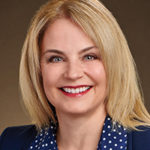
“We really believe in serving our communities; we as a leadership team do a good job living the values and some of that comes from the way that the bank was founded but [also] Kevin and the executive team. They really do put people first.”
And the focus on inclusion, Lane said, is driven by a desire to make the bank “the best it can be.”
That doesn’t mean leading is easy, especially as the bank continues to grow. (In September, it announced its intent to merge with South Dakota-based Great Western Bancorp.) All six women work long hours, some 50 to 60 hours per week. It’s what their positions demand of them at this moment.
But acquisitions often open doors. Mutch recalled the years when FIB was just starting to acquire banks. “When we would do an acquisition, I’d ask: ‘Can I sit in on the negotiations? Can I attend board meetings to know what’s important to the board?’
“If the broader finance team needed somebody to do [something], I would just raise my hand,” Mutch explained.
It goes back to raising hands, and some women will always hesitate. Delahunt Hubbell, who chose not to have children, understands. “You’re never going to achieve balance,” she said. “So you have to make choices as an employer.”
FIB has been flexible allowing remote work, Delahunt Hubbell said. “If we were strict and said ‘no flexibility,’ those people are going to look for other places, to other industries, for employment.
“We are filling our positions because we have a good reputation for supporting people, men and women,” Delahunt Hubbell said. “You have to be willing to accommodate and help women.”
“Take opportunities that present themselves. Don’t be afraid of stretching. Don’t be afraid of taking a job that you worry you might not know how to do. Don’t hold yourself back.”
Marcy Mutch – chief financial officer
“You have every opportunity in the world [in banking]. Do what you do well. Be courageous and be confident. Don’t be intimidated.”
Rachel Turitto – chief human resources officer: “Define what success looks like. What I like about the banking industry is that there are so many different opportunities.”
Tawnie Nelson – regional president
“You are responsible for your own development. Don’t wait for someone to come and tap you on the shoulder. Proactively reach out. And don’t be afraid to be yourself and use your voice.”
Lorrie Asker – regional president
“When somebody asks you to take on a new project or to try something that you don’t think you’re qualified for, give it a shot and take some chances.”
